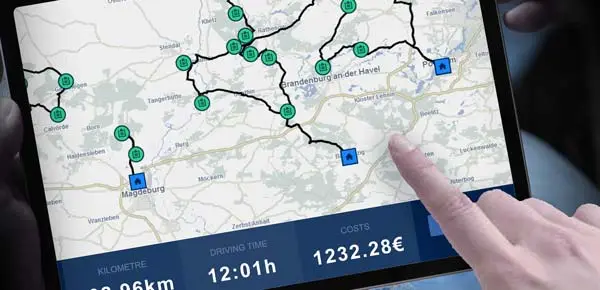
BLOG / SOLUTIONS · FIELD SERVICE MANAGEMENT
WHAT IS FIELD SERVICE MANAGEMENT?
04 January 2022 · Jeremy Squire
FROM THE VERY BEGINNING: WHAT DOES FIELD SERVICE MEAN?
Field Service Management is derived from, you guessed it, primarily any service that takes place on site at a customer location. The employees of Field Service work 'out in the field'.A classic example is home maintenance and repairs by service technicians in buildings or on equipment. The term field service is also often used to describe the field service division/business unit of a company.
If the focus of the field service is more on sales and merchandising, the terms field sales and field merchandising is more commonly used. The sales staff who represent, advise, and sell 'in the field' are sometimes known as a field force.
THE GOALS OF GOOD FIELD SERVICE MANAGEMENT
The main goal of field service management is satisfied customers and profitable business. Employee satisfaction must also be a key focus. Good field service management ensures high service quality and makes all field service processes as efficient and cost-saving as possible.The goals can be further broken down into efforts such as:
- Shortest possible waiting times for customers
- Punctuality and reliability of customer service
- A high first-time-fix rate
- Prediction of maintenance requirements (predictive maintenance)
- High and fair capacity utilisation of employees
- Avoiding/lowering idle times
- Transparent field service processes
An essential role in achieving these goals is played by the optimal scheduling and distribution of all necessary resources (people, skills, vehicles, tools, parts). Therefore, scheduling and route planning in the field are important tasks of Field Service Management.
WHAT MAKES THE TASK SO DIFFICULT
Field Service Management encompasses many different measures to optimise operational processes. The triangle of customer satisfaction, employee satisfaction, and costs always represents a certain area of tension that must be balanced. If, for example, a company increases the workload of its employees in order to process all customer requests quickly, this can be at the expense of employee satisfaction and the potential to lose knowledge and skills.In addition, scheduling or dispatching is an extremely demanding task. Careful advance planning of orders is required, in which the scheduler must take many restrictions into account..
Restrictions can be, for example, a specific date for order processing, service level agreements (SLA), the different skills of the employees and their travel times, route disruptions and visit dependencies.
But good advance planning is not enough. Field service management must also be able to react quickly and flexibly to changes in the daily schedule. In reality, there are absences due to illness, last-minute cancellations by customers, new ad hoc orders and delays due to traffic jams or supply chain pressures (such as spare parts).
WHICH INDUSTRIES USE FIELD SERVICE MANAGEMENT?
Field Service Management can be found in many different industries. Utilities, energy supply including gas, water and electricity, the health sector, the construction industry, but also telecommunications are industries in which field service management is used.Field service staff are also employed in areas that may not immediately spring to mind. For example, surveyors for property and insurance, or employees in mobile facility management are also part of the field service. Here you will find an overview of the industries that use FLS products for field service management.
TODAY'S CHALLENGES IN FIELD SERVICE AND CUSTOMER SERVICE
The biggest challenge in field service management is the 'optimisation' planning of the distribution of resources. Staff and vehicles should be coordinated in the best possible way so that operations take place as efficiently as possible.The demands and expectations of customers have vastly increased in recent years. Digitalisation is increasingly leading to an 'always-on-demand' expectation with short delivery or service times and highly flexible customer service.
At the same time, field staff are often stressed by increased order volumes, which is where errors most occur. This is a challenge that must be overcome.
Companies are also struggling with the long-standing shortage of skilled workers and rising costs. If outdated, time is wasted through adding more and more 'analogue' processes. Field service management quickly reaches its limits.
In recent years, many companies have therefore switched to software-based field service management.
SOFTWARE FOR FIELD SERVICE MANAGEMENT
In today's world, there are many complex data streams. Business models are adapted and structures as well as processes are revised. This is a key to remaining competitive in the field service market.Machine learning can help to reduce the workload of employees. Many companies have already expanded their business model to include new technologies and implemented software solutions in their daily operations.
A suitable software solution can help field staff and management in a variety of ways:
- Specialised algorithms are clearly superior to manual scheduling. They optimise schedules and tours and ensure a reduction in costs and higher productivity.
- Optimised routes reduce travel costs and CO2 emissions.
- Via an app, field forces have access to order-relevant data. Live updates, customer insights and remote access become possible.
- Via a customer portal, companies can engage customers much better and offer them desired and much more precise appointment windows.
- Customers can receive automatic notifications about the estimated arrival time of the technician, which also improves the customer experience.
In practice, one can also increasingly observe that so-called enterprise asset management software is used. This enables a company to optimise the maintenance of equipment. The help is provided by centralising asset information and artificial intelligence processes the calculations in the background.
A specialised and modern type of software is augmented reality technology (AR). AR glasses are found more frequently. These have the advantage that experts can connect via video and observe situations realistically. This creates an immense advantage, because AR can depict reality even though people are not even on site.
Video – How software supports your service and your customers:
You are currently viewing a placeholder content from Default. To access the actual content, click the button below. Please note that doing so will share data with third-party providers.
More InformationTHE ADVANTAGES OF LIVE FIELD DATA FOR COMPANIES
Another point is that field technicians also receive more support. Remote support and digital tools can ensure that formalities and rules are adhered to, but that tasks are still completed quickly and efficiently.Furthermore, field service costs are significantly reduced. This is because the use of relevant data helps to find the right moment for the maintenance work. This way, the task is completed in the most effective way.
Specialised software pays off for all goals of field service management. It helps to skilfully balance the triangle of customer and employee satisfaction as well as cost efficiency.
HOW IS FIELD SERVICE MANAGEMENT DEVELOPING?
Technical support for field service will continue to increase. Progressive networking (Internet of Things) opens up new possibilities such as predictive maintenance based on process and device data.Concrete solutions are required that encompass all relevant information flows. With mobile solutions and new technologies such as augmented reality, the employees out in the field have more possibilities to process the orders to the satisfaction of the customers. Digital tools also accelerate and improve the exchange of information with the office staff and dispatching.
Field operations and on-site customer service will remain essential. Not only in technical operations, but also in customer contact and brand experience. In a post-pandemic market, workd-of-mouth is playing an increasingly important role for companies. Good field service management is a central building block for an inspiring customer experience and will therefore become even more important in the future.
BEGIN YOUR FIELD SERVICE MANAGEMENT JOURNEY
To gain an understanding of tools to optimise the field experience for your workforce and customers book a short discussion or contact us at info@fastleansmart.com.Read more:
How to recognise excellent Field Service Management
Field service automation: next generation Field service
Interfaces: ERP and CRM integration in record time with API

JEREMY SQUIRE
UK Managing Director
Call +44 1183 800189
Send email ›
Jeremy Squire is a business leader and solutions consultant with over 20 years experience in field service scheduling and route optimisation software solutions. He is one of Europe's most recognised and regarded voices in field service technology.





